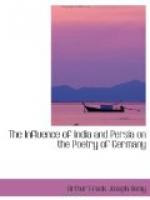On p. 329 Rueckert offers a free, but faithful, even if abridged version of selected passages from the introductory chapters of Nidami’s work (Isk. tr. Clarke, canto ii, p. 18 seq. and canto vii, p. 53 seq.). In “Kiess der Reue,” p. 421, he paraphrases the episode of Alexander’s search for the fountain of life from the Shah Namah (tr. Mohl, v. pp. 177, 178). The story of Bahramgur in the same work (tr. Mohl, v, pp. 488-492) appears in “Allwo nicht Zugethan,” p. 397. It is not taken from Firdausi, for it relates the story somewhat differently, and introduces a love-episode of which the epic knows nothing.[182] Again, “Der in die Stadt verschlagene Kurde,” p. 229, is an anecdote which Rueckert had already translated in the Haft Qulzum (see his Poet. u. Rhet. der Perser, pp. 72-74), while “Gluecksgueter,” p. 233, may have been suggested by a story of Attar which he published afterwards (1860, ZDMG. vol. 14, p. 286). Some anecdotes of Persian princes or poets are also utilized, e.g. “Das Kuechenfeldgeraethe des Fuersten Amer,” p. 226 (d’Herb. iv. 459; Malcolm i. p. 155), “Der Spiegel des Koenigs,” p. 223 (Deguignes, ii. 171), and the story of Jami and the mulla, p. 224 (M. Kuka, The Wit and Humour of the Persians, Bombay, 1894, pp. 165, 166). In one poem, “Ormuzd und Ahriman,” p. 344, an Avestan subject is treated, the later Parsi doctrine of zrvan akarana.[183]
* * * * *
The great majority of the poems in this collection are concerned with India, its literature, mythology, religious customs, geography and history, and it will be convenient for our purpose to discuss them under these heads.
In the first group, that which takes its material from Sanskrit literature, we meet with the story of the flood, p. 298, from the Mahabharata (Vana Parva, 187) and the story of Rama’s exploits and Sita’s love, p. 268, from the Ramayana. Also a number of fables from the Hitopadesa or Pancatantra occur, e.g. that of the greedy jackal, p. 249, familiar from Lafontaine (Hit. i. 6; Panc. ii. 3), and that of the lion, the mouse and the cat, p. 250 (Hit. ii. 3). The story of the ungrateful man and the grateful animals, p. 252, is found in the Kathasaritsagara (tr. Tawney, ii. pp. 103-108; cf. Pali version in Rasavahini, Wollheim, Die National-Lit. saemtlicher Voelker des Orients, Berl. 1873, vol. i. p. 370). “Katerstolz und Fuchses Rath,” p. 243, has for its prototype the fable of the mouse changed into a girl in Pancatantra (iv. 9; cf. the story of the ambitious Candala maid in Kathas. tr. Tawney, ii. p. 56). King Raghu’s generosity to Varatantu’s pupil Kautsa, as narrated in the Raghuvamsa (ch. v.), is the subject of a poem on p. 402. Two famous pieces from the Upanisad-literature are also offered: the story of how Jajnavalkya overcame nine contestants in debate at King Janaka’s court and won the prize consisting of one thousand cows with gold-tipped horns, p. 247, from the Brhadaranyaka Up. iii. (see Deussen, Sechzig Upan. uebers. Leipz. 1897, p. 428 seq.), and the story of Naciketas’ choice, p. 403, from the Kathaka Upanisad. To this group belong also versions of Bhartrhari, p. 337 (Nitis. 15) and p. 338 (Nitis. 67).




